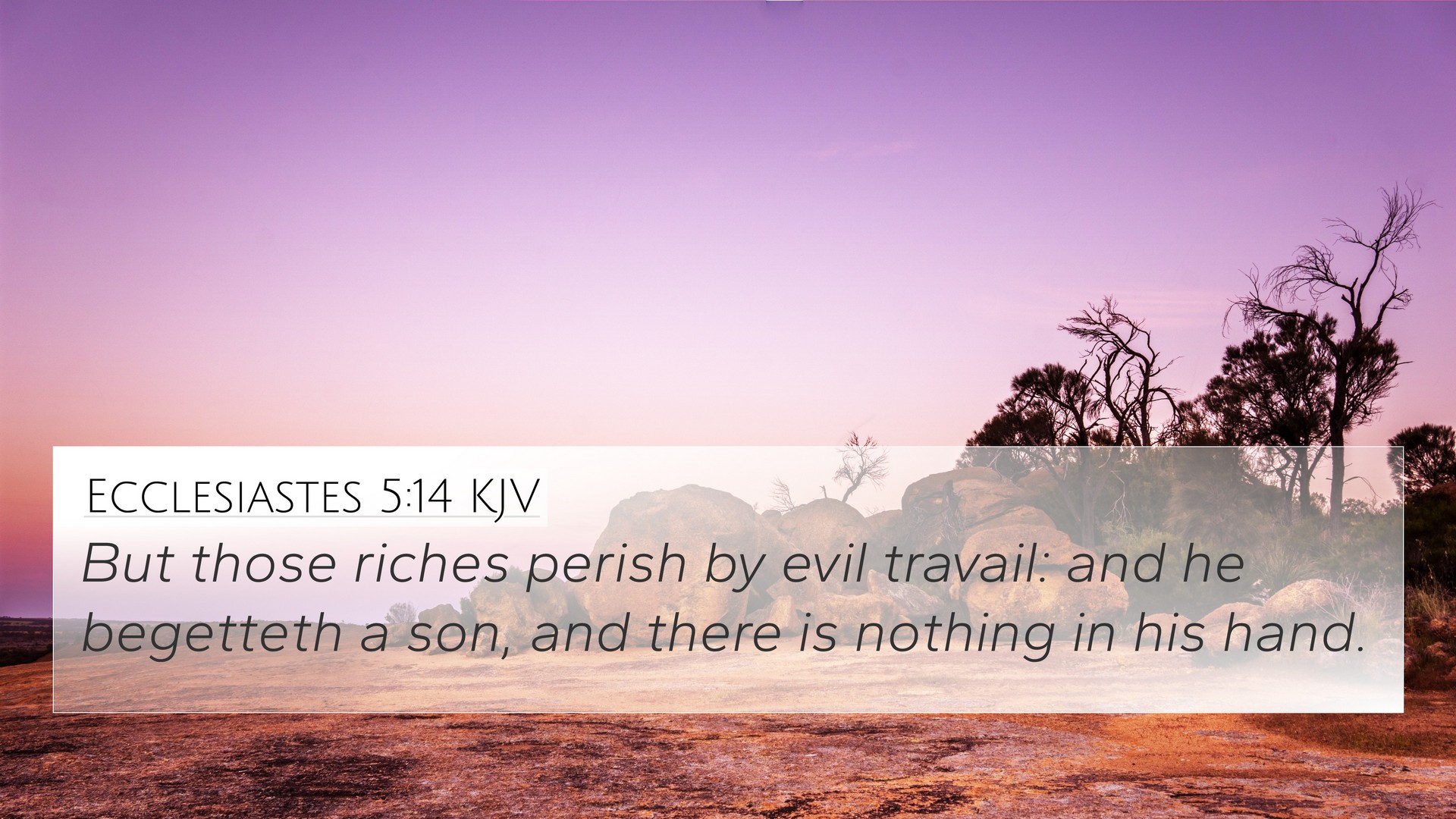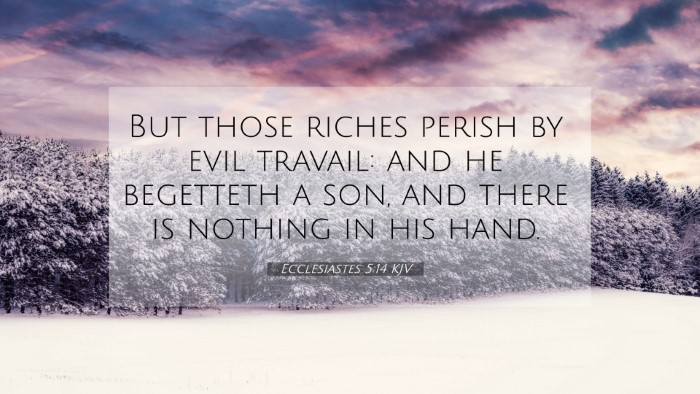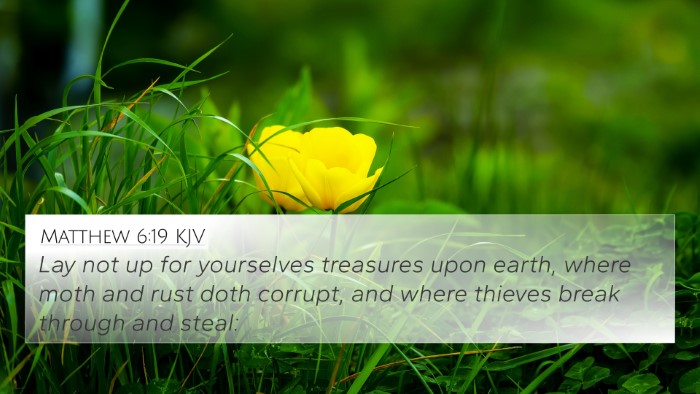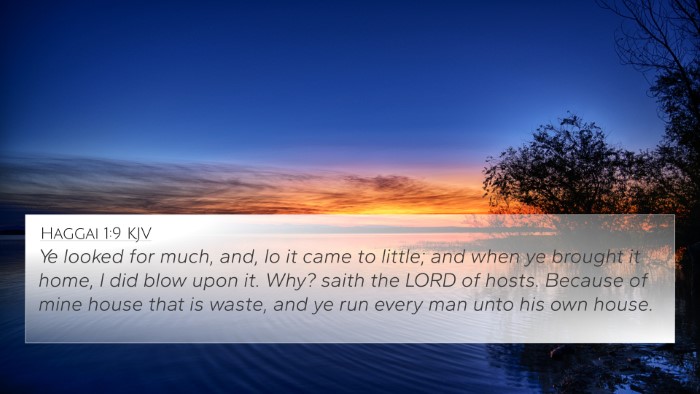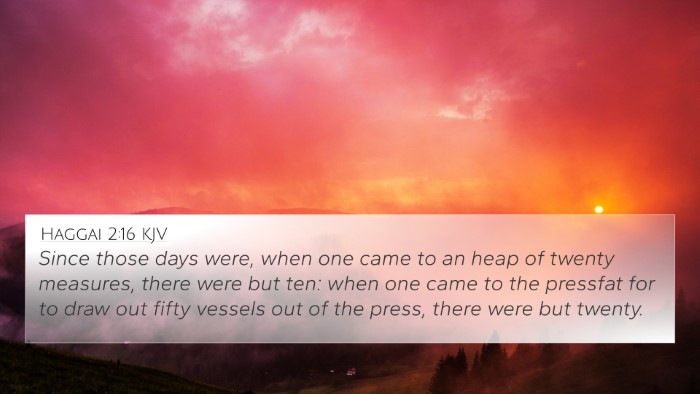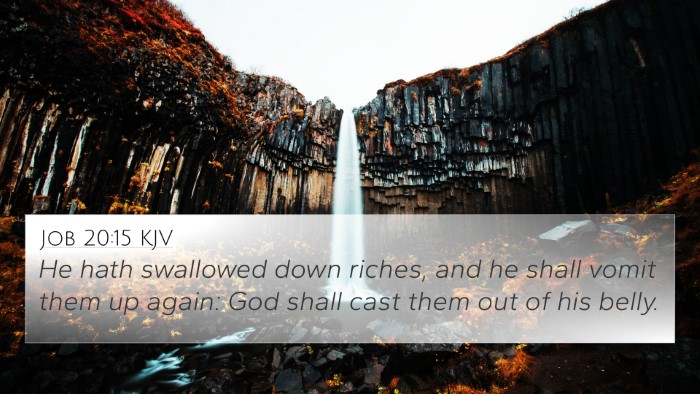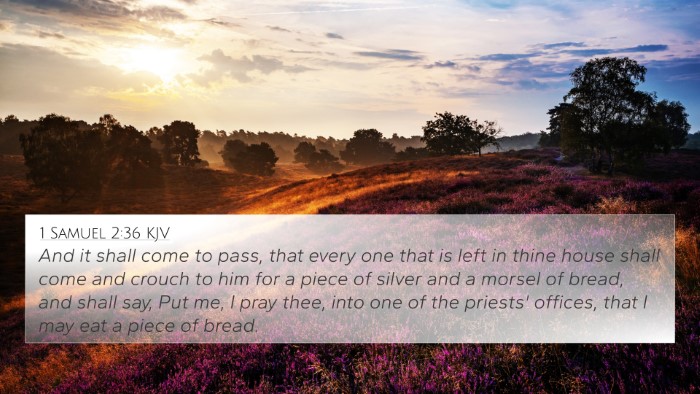Understanding Ecclesiastes 5:14
Ecclesiastes 5:14: “But those riches perished by evil travail: and he begetteth a son, and there is nothing in his hand.”
Overview of Ecclesiastes 5:14 Meaning
In this verse, the author reflects on the futility of wealth and its transient nature. The phrase "evil travail" highlights the struggles and injustices associated with acquiring wealth, suggesting that despite one’s efforts, riches may be lost, leaving nothing for future generations. It serves as a poignant reminder of the vanity of earthly pursuits and the inevitability of death.
Commentary Insights
Matthew Henry’s Commentary
Matthew Henry asserts that the verse illustrates the vanity of worldly wealth. He emphasizes that wealth obtained through hardship and toil ("evil travail") is often ephemeral. Henry encourages readers to consider the spiritual treasures that endure compared to material riches that cannot be taken beyond the grave.
Adam Clarke’s Commentary
Adam Clarke elaborates on the idea of wealth and its impacts on legacy. He notes that while one may amass riches, true value lies not in material possessions but in what is passed on to the next generation. Clarke points out the importance of moral and spiritual inheritance over physical wealth.
Albert Barnes’ Commentary
Albert Barnes highlights the inevitability of death and the idea that material wealth cannot be carried into the afterlife. He reflects on the risks of placing one’s security in riches, noting how quickly they can vanish and leave individuals empty-handed, particularly in the face of death.
Key Themes
- The Transience of Wealth: Wealth is temporary and cannot be relied upon for lasting happiness.
- Legacy and Inheritance: The importance of passing on wisdom and values, rather than just material goods.
- Life's Finitude: The knowledge that life is short, and our focus should be on what is eternal.
Cross References Related to Ecclesiastes 5:14
- Proverbs 23:4-5: "Labour not to be rich; cease from thine own wisdom." This passage warns against the pursuit of wealth.
- Matthew 6:19-21: "Lay not up for yourselves treasures upon earth... For where your treasure is, there will your heart be also." Jesus emphasizes the importance of eternal values over temporal wealth.
- 1 Timothy 6:7-10: "For we brought nothing into this world, and it is certain we can carry nothing out." This affirms the futility of clinging to material possessions.
- Luke 12:15: "Take heed, and beware of covetousness: for a man's life consisteth not in the abundance of the things which he possesseth." A reminder to not equate life’s worth with material wealth.
- Psalm 39:6: "Surely every man walketh in a vain show: surely they are disquieted in vain: he heapeth up riches, and knoweth not who shall gather them." This reinforces the idea of the vanity of wealth accumulation.
- Mark 8:36: "For what shall it profit a man, if he shall gain the whole world, and lose his own soul?" A stark reminder of the cost of pursuing wealth at the expense of spiritual health.
- James 1:10-11: "But the rich, in that he is made low: because as the flower of the grass he shall pass away." This connects wealth with transient beauty.
Conclusion
The examination of Ecclesiastes 5:14 through various commentaries reveals a unified theme: the emptiness of material riches. By understanding the transient nature of wealth and focusing on spiritual inheritance, believers are encouraged to seek eternal treasures rather than temporal gains.
Further Reflections
By studying cross-references, one can gain deeper insights into how various Bible verses connect and support the teachings found in Ecclesiastes 5:14. The interconnectedness of scriptures enriches our understanding of Biblical wisdom. Tools such as a Bible concordance or cross-reference Bible study guide can assist those looking to delve deeper into these themes.
Tools for Bible Cross-Referencing
- Bible Concordance: Essential for finding specific verses related to broad themes.
- Bible Reference Resources: Useful for discovering cross-references and thematic links throughout scripture.
- Bible Chain References: Connects verses thematically for comparative study.
- Comprehensive Bible Cross-Reference Materials: Advanced studies can enhance one’s understanding of scriptural connections.
Recommended Study Methods
Utilize various cross-referencing Bible study methods to explore how Ecclesiastes 5:14 relates to other scriptures, helping to build a comprehensive understanding of its themes.
